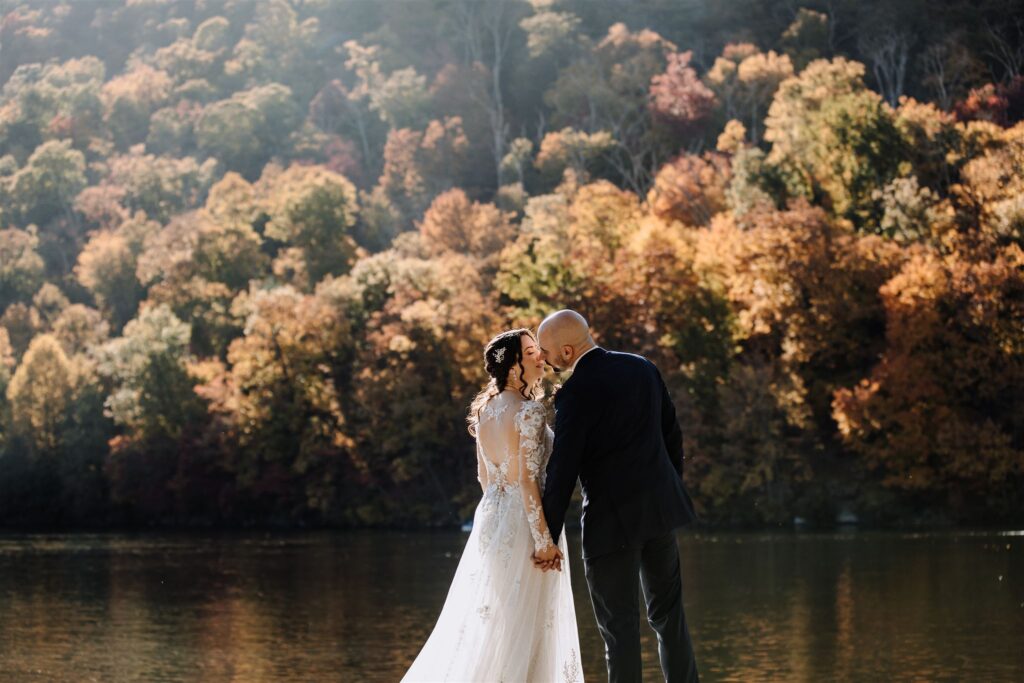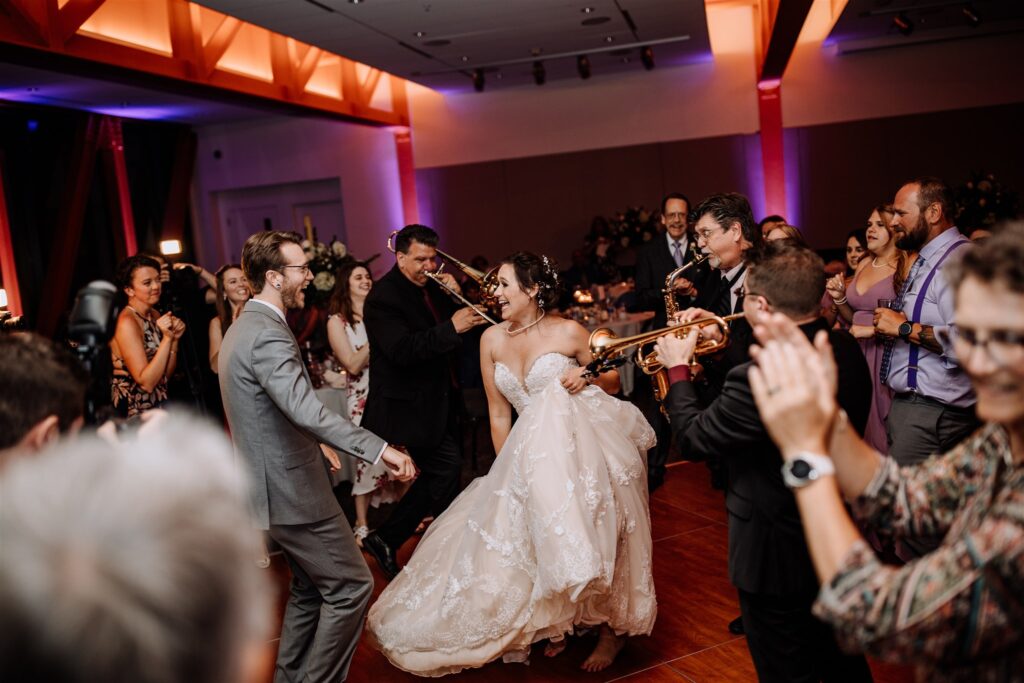We're a team of wedding, elopement and portrait photographers who put community over competition. We provide tips and resources for Photographers looking to up-level their businesses.
We're here to help When you join The Photography Business Academy
How many photos should a wedding photographer give their clients?
With over 20+ years of experience as wedding photographers, we have a ton of experience going to weddings, filling up SD cards with tons of images, then narrowing those down into a final gallery we deliver to our wedding clients.
One of the biggest questions that remains top of mind, both for clients looking to hire a photographer and for photographers looking to make sure they provide enough images to their clients, is – how many photos should a wedding photographer give their clients?
In our experience, wedding photographers aim to provide around ~100 fully edited, digital images per hour of shooting time during a wedding.
Some variance here, let’s say between 70 fully edited images per hour up to 120 fully edited images per hour would likely still be within a fairly “normal” range.
While every individual wedding photographer will be different on this, you will find that the average wedding photographer delivers at least this much.
That means for the average 8 hour wedding day, the gallery delivered will be around 800 images.
With wedding photo galleries of this size, there are additional things to keep in mind while you look to price your wedding photography services.
And while we’ve addressed the core reason you’re here, we suggest reading on to understand why this tends to be the normal amount of delivered photos!

Additional things wedding photographers should think about when it comes to delivered images
Quality of images, not quantity
In the world of wedding photography, quality is definitely more important than quantity.
You probably hear this a lot (about pretty much anything, right?), and it’s important to keep in mind.
We would want to add to this sentiment, though, because most clients who are hiring you for a good portion of their day will also expect at least an average level of quantity (~100 images per hour).
The reason for this is because so much happens at a wedding, and clients want to be able to look at their photos and remember all of the little bits and pieces throughout.
With this said, you could provide a client with 6,000 images from their wedding and just overwhelm them. With this many photos, it’s likely most of them aren’t even particularly good or interesting – which are two subjective measures that can help you decide when you want to share the photos with your clients (or not).
In some circumstances, you may be able to provide less images (even less than the averages we highlighted above) if the quality is high. Many top wedding photographers in the world do this, and their clients like a really refined gallery of best moments and shots.
The photos you take are not the ones you deliver
Professional wedding photographers typically take thousands of images throughout the wedding day.
Just this past weekend at a wedding, I shot over 10,000 myself (thanks rapid shutter!).
Afterwards, they will cull the images to the best selections…
This curation process is a part of the process of working with a pro photographer most of the time.
There are many reasons why wedding photographers don’t typically share all of the images they shoot, a few reasons include…
- Duplicate moments
- Test shots
- Out of focus images
- Not interesting
- Bad facial reactions
- Poor lighting
- Technical mishap (like flash not firing)
- Too many images can overwhelm a client
One of the biggest selling points of hiring a wedding photographer (vs. just letting friends and family take phone pics all day) is not just for the technical and creative abilities of the photographer (though those things are important!), but because of their ability to cull the images to a reasonable gallery size that makes remembering the day that much more easy and special.
Focus on the images your clients want
Many photographers provide their clients with opportunities to share any specific photos they’d like to have. This can range from receiving a full-blown shot list to smaller suggestions like just mentioning the specific detail items they have.
In our experience, we typically ask for key info about the wedding day in a wedding photo questionnaire (if you don’t have one of these, we share free questionnaire templates in our Client Experience for Photographers Course by the way!). We reserve some space in there for special requests, as well as putting together a family photo list.
Don’t have a shot list or any specific photo requests from your clients?
We suggest aiming to give a gallery with the following break downs.
- Getting Ready photos – 20% of your gallery
- Couples First Look & Portraits – 20% of your gallery
- Group Photos (Family & Wedding Party) – 15% of your gallery
- Ceremony Photos – 10% of your gallery
- Reception – 35% of your gallery
Breaking this out for a gallery with 800 images you’d deliver…
- 160 Getting Ready photos
- 160 First Look & Couples portraits
- 120 Group photos
- 80 Ceremony photos
- 280 Reception photos
When looked at like this and factoring in a range of angles, different camera perspectives (wide shots and tight shots), staged photos and candids…all the sudden 100 images per hour seems completely reasonable!

How you show off the image’s matters
How you showcase the images from the wedding matters.
Why?
Put yourself in your clients shoe’s here. What sounds better of the options below…
1). You receive all of your images in a Dropbox folder. In order to view them, you need to scroll through each image individually. Downloading photos can take a lot of time because this system is not well optimized.
2). You receive all of your images in an online gallery created for photographers. All of your images are showcased in a grid and load quickly. Downloading images is quick because you have easy access to web size downloads.
(Hint: The answer is #2)
We always recommend for pro wedding photographers to use an online gallery storage solution. These are affordable, enhance the client experience, and often have other features like an integrated print store that can even help you recoup your costs (and make more, too!).
Check out that link above to see some great options for online galleries!

Always use a contract and define how many images a client will receive
One of the most important things you need to learn to do when you’re a wedding photography businesses is how to set expectations with your clients.
While you should have some discussions on the phone or via email, spelling your terms out in a contract is important as a point of reference.
We recommend indicating how many images a client will receive in your wedding photography contract, as well as defining what those images will look like (“full resolution, JPEG, edited images” is more concise than “images”) and sets a better expectation.
Need a contract? Check out some recommended Contract Templates for Photographers.
Tips for Creating Backups of Your Wedding Images
Now that we’ve established how many photos you should plan to give your clients as a wedding photographer, we want to talk about how to ensure the images you take are being stored effectively.
Double write on SD cards while shooting the wedding
Most professional cameras include the ability to write images to 2 SD cards at one time. For wedding and event photographers, it’s crucial to use this as any lost images will be impossible to replace or replicate.
We have had SD cards fail while shooting at a wedding, and were able to ensure images were still backed up and good to go by removing the failed card, storing the safe backup in a secure case, and switching out to new cards.
It’s a good practice to also keep the SD cards until the delivery of the full gallery set for extra safety.
Copy images to an external hard drive upon return home
When you arrive home from a wedding, we recommend backing up images to an external hard drive. This allows you to have a 3rd backup of the files.
For extra protection, use multiple external hard drives or cloud storage solutions
In the world of tech, there is a common saying that goes like this…
“One is none, and 2 is one”
This is in reference to backups.
If you only have 1 backup, it’s as good as having none because if it fails, your entire project will be lost. Having multiple backups just provides extra layers of security.
You can also consider cloud storage solutions for backing up your files.
Conclusion
Wedding photographers should plan to give around 800 edited images to their clients for a regular day’s work.
We’d consider anything in the range of 600 – 1,000 photos to be “normal” as far as final image counts go!
We do use this loosely as wedding photographers typically operate as independent businesses, so every photographer may do things a little differently depending on their style and the expectations they set with their clients.

Honesty is a cornerstone of Shoot and Thrive, so we want you to know that some links in this post are affiliate links. This means we may earn a commission if you make a purchase—at no additional cost to you. We only recommend products and services we trust, have used ourselves, or have thoroughly researched based on industry feedback. Our goal is to provide solutions that genuinely help, whether they come from our direct experience or the collective knowledge of the photography community.
As photography business educators, we believe it's important for educators in this industry to be active photographers themselves. The images used throughout this website were taken through our photo studios - Hand and Arrow Photography and Marshall Scott Photography, except for stock images or if otherwise noted.
Turn Your Passion into a Thriving Business
Transform your photography business into a streamlined, profitable venture that gives you more time, freedom, and confidence.
With the Photography Business Academy, you’ll have a step-by-step guide to building the business—and life—you’ve always dreamed of. From branding to marketing, finances to client experience, we’ve got you covered.
Navigation
Shoot and Thrive is an ethically created resource for photographers needing mentorship, coaching, or business education. We believe in creating content that’s easy to digest and retain while incorporating educational best practices, so you gain clarity and confidence as a business owner.